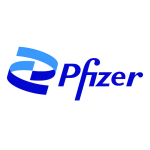Welcome to our dedicated page for Pfizer news (Ticker: PFE), a resource for investors and traders seeking the latest updates and insights on Pfizer stock.
Pfizer Inc. (PFE) is a global biopharmaceutical leader driving innovations in vaccine development and therapeutic treatments. This news hub provides investors and industry professionals with timely updates on corporate developments, regulatory milestones, and market strategies.
Access official press releases, earnings reports, and analysis of Pfizer's clinical trial progress. Our curated collection covers FDA approvals, partnership announcements, and research breakthroughs across oncology, immunology, and infectious disease portfolios.
Key updates include quarterly financial results, manufacturing expansions, and strategic collaborations shaping the pharmaceutical landscape. Bookmark this page for reliable insights into one of healthcare's most influential companies, with content organized for efficient navigation across devices.
The U.S. FDA has expanded the Emergency Use Authorization (EUA) for the Pfizer-BioNTech COVID-19 Vaccine to include booster doses for individuals aged 12 and older. The booster maintains the same 30-µg dosage as the primary series, addressing rising COVID-19 cases. Additionally, the waiting time for the booster after primary series completion has been reduced from six to five months. A third primary series dose is also authorized for immunocompromised children aged 5-11. Pfizer and BioNTech have delivered 1 billion doses to low- and middle-income countries, with an additional billion expected in 2022.
Pfizer Inc. (NYSE: PFE) will host a webcast featuring Albert Bourla, Chairman and CEO, at the Goldman Sachs 14th Annual Healthcare CEOs Unscripted Conference on Thursday, January 6, 2022, at 10:00 a.m. EST. Investors and the public can join the discussion by visiting www.pfizer.com/investors. A transcript and replay will be available within 24 hours and accessible for 90 days. Pfizer continues its commitment to advancing healthcare and collaborating globally to improve patient lives.
Pfizer (NYSE: PFE) will host a conference call for investors at 10 a.m. EST on February 8, 2022, to discuss its Fourth Quarter and Full Year 2021 Performance Report. The report will be released that morning. Interested parties can access the webcast and report on www.pfizer.com/investors. For audio access, dial (833) 708-1779 in the U.S. or (602) 585-9859 internationally, using the passcode “020822”. A transcript and replay will be available for 90 days after the call.
Pfizer Inc. (NYSE: PFE) announced that the FDA has authorized emergency use of PAXLOVID™ for high-risk patients aged 12 and older with COVID-19. Clinical data from the EPIC-HR study shows PAXLOVID reduces hospitalization or death by 89% within three days of symptom onset. Pfizer plans immediate U.S. delivery and has increased production from 80 million to 120 million treatment courses by the end of 2022 due to demand. Additionally, Pfizer aims for full FDA approval in 2022 and has agreements with various countries for equitable access to the treatment.
Pfizer (NYSE: PFE) announced an agreement with the UK government for an additional 2.5 million doses of PAXLOVID™, bringing the total to 2.75 million doses, subject to regulatory approval. PAXLOVID, an investigational antiviral, has shown to reduce hospitalization risk by nearly 90% in high-risk patients. Pfizer expects to manufacture up to 80 million courses by year-end. The company is committed to equitable access and has invested approximately $1 billion in manufacturing and distribution efforts, collaborating with around 100 countries and signing agreements to expand access in low- and middle-income nations.
ViiV Healthcare has received FDA approval for Apretude, a long-acting injectable HIV pre-exposure prophylaxis (PrEP), the first of its kind to show superior efficacy compared to daily oral options. It is indicated for adults and adolescents over 35 kg at risk of HIV. Apretude can be administered as few as six times a year, with studies showing a 69% to 90% lower incidence of HIV compared to daily oral options. This innovative treatment addresses the needs of vulnerable populations, particularly in Black and Latinx communities, providing an alternative to daily pills.
Pfizer Inc. (NYSE: PFE) announced a post-hoc analysis published in Circulation: Heart Failure demonstrating a significant survival benefit for patients with transthyretin amyloid cardiomyopathy (ATTR-CM) treated with VYNDAQEL/VYNDAMAX. Following nearly five years of median follow-up, continuous treatment showed a 41% reduction in all-cause mortality compared to placebo. The median survival was 67 months in the continuous treatment group versus 35.8 months for those who received placebo first. These findings reinforce the importance of early treatment for ATTR-CM.
Pfizer and BioNTech announced an agreement with the European Commission to deliver over 200 million additional doses of their COVID-19 vaccine, COMIRNATY, in 2022. This brings the total planned doses for the year to more than 650 million. The contract will include potential vaccines adapted for the Omicron variant at no additional cost. Pfizer and BioNTech had previously agreed to supply 900 million doses to the EC for 2022 and 2023, with an option for up to an additional 900 million doses.
Pfizer (NYSE: PFE) received favorable advice from the European Medicines Agency's CHMP for its antiviral treatment PAXLOVID, indicating its use for adults at increased risk of severe COVID-19. The CHMP recommends timely administration within five days post-diagnosis. This advice supports EU member states in potential emergency use before official marketing authorization. PAXLOVID demonstrated an 89% reduction in hospitalization or death in clinical trials compared to placebo. Pfizer aims to ensure equitable access and plans to invest up to $1 billion in manufacturing and distribution.
Pfizer (NYSE: PFE) announced FDA approval for XELJANZ® (tofacitinib) to treat adults with active ankylosing spondylitis (AS) who have inadequate response or intolerance to TNF blockers. This approval is based on a Phase 3 study involving 269 patients, where tofacitinib showed significant efficacy over placebo (ASAS20 response: 56.4% vs. 29.4%, p<0.0001). XELJANZ is notable as the first oral JAK inhibitor approved for five immuno-inflammatory indications in the U.S., providing a non-injection treatment option for AS, a condition affecting over 350,000 Americans.


